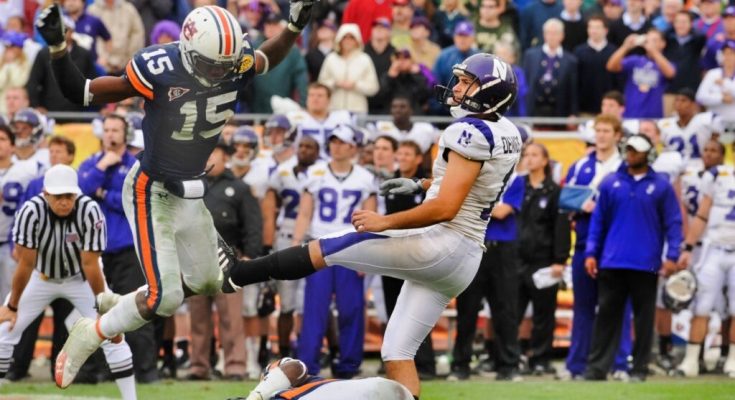What Is Roughing The Kicker In The NFL? Find Out

The NFL is quite a physical game in itself. While an athlete attempts to run with the ball toward the touchdown, the entire defense of the opponent goes off to prevent the athlete from scoring. In other instances, a skillful player might avoid the interception and continue to threaten the defense. This is where a defensive player might resort to illegal tactics to stop the play. These are known as fouls, and the NFL rulebook lists a host of fouls for which a penalty is given.
This is usually done to save the athletes from getting seriously injured, in turn protecting the integrity of fair play. One such rule is ‘Roughing The Kicker.’ Here’s everything that you need to know.
What Is Roughing The Kicker In The NFL?
Sometimes, when an offensive player attempts to punt or kick the ball into the opponent’s defense, attempts are usually made to block the kick. However, in case of a missed block, defenders might often make body contact by kicking the player or shoving the player aggressively to disrupt the play. Now, such a play is a strict no-no in the NFL. Thus, to sum it up, the play where the opponent’s defense is roughing the kicker up in an unfair manner is known as Roughing the Kicker in the NFL.
What Does The NFL Rulebook Say About The Foul?
As per the NFL rulebook, a foul shall be immediately called in case the defender: “contacts the plant leg of the kicker while his kicking leg is still in the air slides into or contacts the kicker when both of the kicker’s feet are on the ground.” However, there are exceptions to these rules. Despite a contact with the kicker being made, it won’t be considered a foul if the impact is not severe. It is also not a foul when a kicker lands on the ground with both legs after the defense has hit him or falls on one of the defenders.
What Is Running Into The Kicker Foul?
Well, Roughing the Kicker and Running into the Kicker are both almost identical fouls. In the case of Running into a Kicker foul, a foul is called at the first contact with the leg of a kicker. A referee will call the foul even if the kicker is airborne at the point of contact.
A foul can also be committed by sliding underneath the airborne kicker. This will disrupt the kicker’s motion. And would make it difficult for the athlete to land on the ground with both feet.
A foul can also be committed by sliding underneath the airborne kicker. This will disrupt the kicker’s motion. And would make it difficult for the athlete to land on the ground with both of his feet.
What Is The Penalty Imposed On Both The Fouls?
Roughing the Kicker foul is more serious than Running into the Kicker. Thus, in the case of the former, the regular rules for a personal foul penalty are being followed. The referee will award the kicking team 15 yards. However, this yardage is usually counted from the previous line of scrimmage and not from the point where the foul took place.
In addition to the yard, the kicking team will also receive an automatic first down. But things could get really bad for the team committing the foul. If the foul is made on a team while they are trying to score a field goal, the kicking team gets the leverage to go for a touchdown instead.
Luckily, the fouls for running into the kicker are not as severe. When such fouls are committed, the referee awards the kicking team 5 yards from the previous line of scrimmage. The kicking team also does not get an automatic first down in case of such a foul.
How Does The Referee Distinguish Between Both The Fouls?
Well, there are some pretty clear instructions as to how a foul will be determined. However, due to its identical nature, the officials might often find it difficult to distinguish between the two. In such cases, the NFL has strict directions for referees. The referees are asked to opt for the more severe Roughing the Kicker penalty to safeguard athletes. It also helps to maintain fair play.


